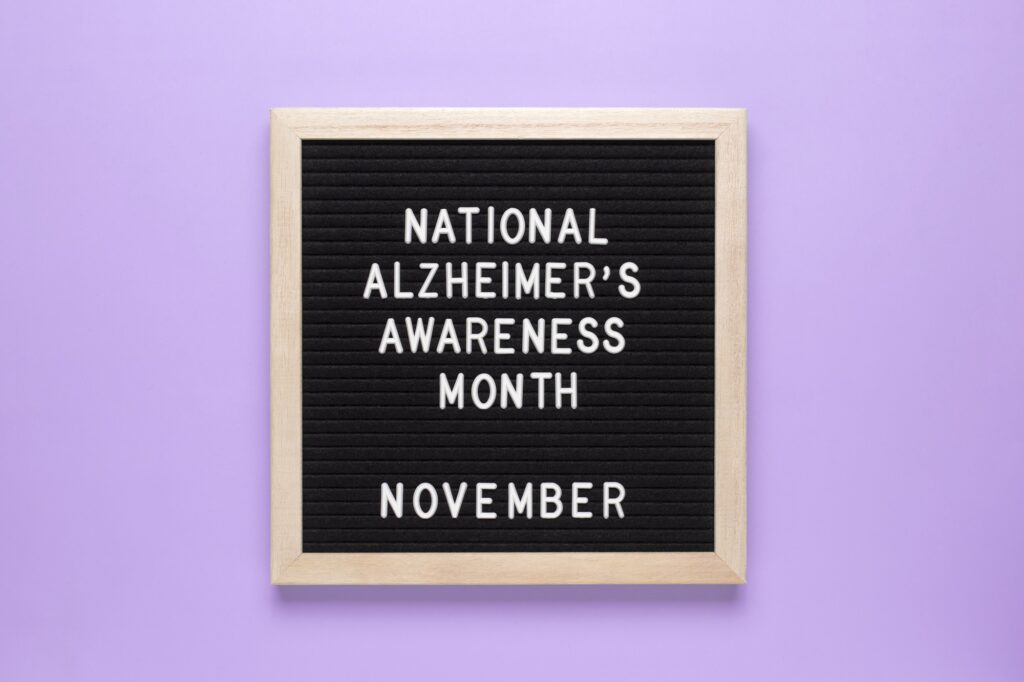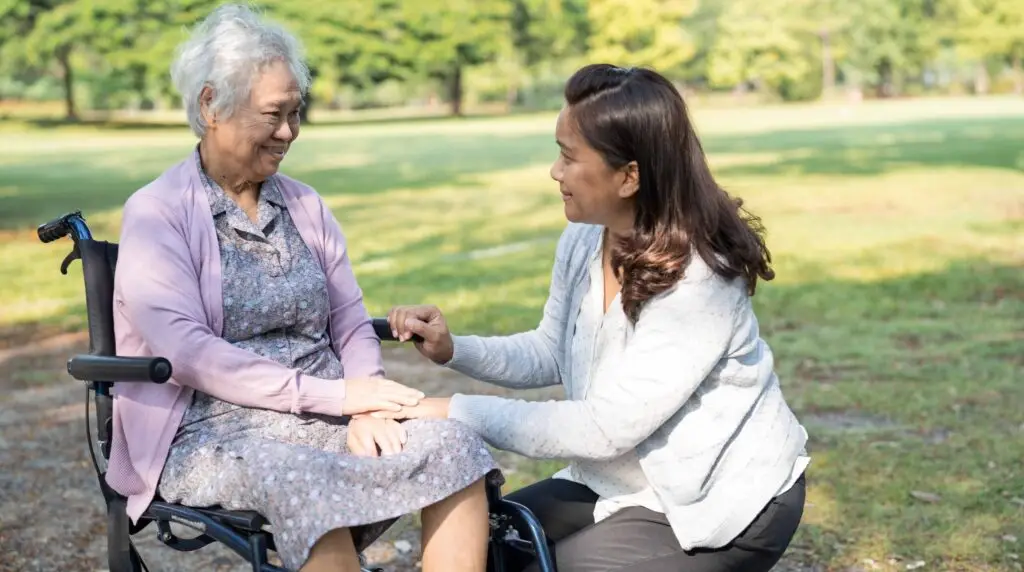
According to a recent study, More than 600,000 Canadians are currently living with dementia and that number is expected to reach 1 million by the year 2030. While there are various kinds of dementia, Alzheimer’s disease is the most common type, affecting millions of people across the globe. Caring for those with Alzheimer’s and other forms of dementia presents unique challenges compared to other types of care for seniors.
What is Alzheimer’s Disease?
Alzheimer’s Disease is named after the doctor who first discovered changes within the brain of a patient with what was, at the time, thought to be an unusual form of dementia. The patient was young—only 50 years old—compared to the typical dementia patient of over 65. Her symptoms were also different from those typically seen in dementia patients at the time. After her death in 1906, Dr. Alois Alzheimer performed an autopsy, discovering shrinkage, abnormal deposits, and tangles within the brain. This discovery eventually led to the disease being officially recognized.
More than a century after its discovery, we now know how Alzheimer’s presents in the brain. The disease causes nerve cell death, shrinkage of the brain, buildup of amyloid plaques (abnormal proteins), and tangles within the dead and dying nerve cells. These changes in the brain cause the symptoms associated with the disease, however, the cause of the disease remains unknown.

Signs and Symptoms of Alzheimer’s
The earliest stages of the disease may lack any outward symptoms. Plaques and tangles begin to form in the parts of the brain responsible for learning, memory, thinking, and planning.
Mild to Moderate Alzheimer’s
In this stage, the plaques and tangles continue to develop in the brain, causing symptoms that may disrupt work or social life. Many people are diagnosed with the disease during this stage. Symptoms of this stage of the disease are:
Memory Loss
Difficulty remembering conversations, events, or appointments is one of the first symptoms commonly reported by those with Alzheimer’s and their loved ones.
Difficulty Performing Daily Tasks
Individuals may take longer than usual or are unable to perform familiar tasks such as dressing and grooming.
Disorientation/Confusion
People living with the disease may be confused about the time or date, become lost in
familiar surroundings, or not know how they got somewhere.
Language Problems
Forgetting words, inability to follow conversation, or understanding language are hallmark signs of Alzheimer’s
Impaired Judgment
As decision-making and problem-solving skills deteriorate, the individual may begin making uncharacteristically poor decisions or taking risks.
Changes in Mood and Personality
While we all get angry from time-to-time, Alzheimer’s can cause dramatic shifts without reason. People may become irritable, withdrawn, and anxious.
Decreased Initiative
People may lose interest in hobbies or activities they once enjoyed.
Severe Alzheimer’s
As the disease progresses, most of the cortex is damaged and the brain has shrunk severely due to cell death. Individuals become completely dependent on others to care for them and may be confined to a bed all or most of the time. At this stage, the person will experience:
- Complete inability to communicate
- Loss of awareness of surroundings and experiences
- Physical decline, such as dental, skin, and foot problems, weight loss and disinterest in food / inability to eat
- Seizures
- Increased sleeping
- Loss of bowel and bladder control
Treatment for Alzheimer’s Disease
While there is no cure for Alzheimer’s disease, there are treatment options to help manage symptoms and improve quality of life. Medications such as Galantamine have been shown to lessen symptoms and slow the progression of the disease.
Lifestyle changes and non-pharmacological interventions are perhaps the most effective ways to support those with the disease. Focusing on the individual’s wellbeing, these include:
Environmental Modifications
Creating a comfortable environment and keeping a routine can help alleviate agitation and anxiety.
Supportive Therapies
Occupational therapy and physical therapy can address challenges specific to an individual.
Safety Planning
As a degenerative disease, it is important to be preventative in safety planning for someone with Alzheimer’s.
Understanding Alzheimer’s-Specific Challenges
Whether being cared for at home by family or a professional caregiver, providing care for people with Alzheimer’s and dementia requires caregivers to adapt to the unique challenges posed by the disease.
Emotional Support and Engagement
Alzheimer’s affects every aspect of a person’s life. Their emotional needs may change over time and providing a supportive environment at any stage is important.
Memory Care
With memory loss being one of the most prominent symptoms of Alzheimer’s, caregivers must help individuals with memory exercises, reminders, and routines that help minimize confusion.
Emotional Stability
Behavioural changes such as anxiety and agitation are common with Alzheimer’s. Caregivers need to provide emotional support, reassurance, and patience.
Communication
Communication becomes increasingly challenging as Alzheimer’s progresses. Caregivers must learn techniques to communicate effectively with those who may struggle with language and comprehension.
Safety and Supervision
Memory loss and poor decision-making lead to increased safety concerns for an individual with Alzheimer’s. Preventative safety measures are key.
Wandering
Those with Alzheimer’s often wander, which can pose risks. Caregivers must implement measures to prevent wandering and ensure the individual’s safety.
Home Modifications
Homes need to be adapted to minimize hazards and prevent accidents, including the installation of locks, handrails, and removal of tripping hazards. For a full list of home safety precautions, click here.
Supervision
When signs of Alzheimer’s begin to show, supervision may be required for tasks that had previously been done with ease. Activities like cooking may present new hazards, such as forgetting a boiling pot of water.

Caring for the Caregiver
The role of caring for a loved one with Alzheimer’s or dementia is both physically and emotionally demanding. Below are some ways to help someone who has taken on this selfless role.
Prioritizing Self-Care
Caregivers often put the needs of their loved ones before their own. However, it’s essential for them to prioritize self-care. Encourage them to set aside time for themselves, whether it’s for a hobby, exercise, or simply relaxation. Self-care helps prevent burnout and maintains their physical and mental well-being.
Seek Support
Caregivers should not hesitate to seek help. This can come in the form of support groups, therapy, or even friends and family. Connecting with others who are in a similar situation can provide a sense of understanding and camaraderie. Additionally, professional help can offer valuable coping strategies and emotional support.
Respite Care
Arrange for respite care, where someone else temporarily takes over caregiving duties. This break allows caregivers to recharge, run errands, or simply take a breather.
Education is Empowerment
Knowledge is power. Caregivers should educate themselves about Alzheimer’s disease, its stages, and caregiving techniques. Understanding what to expect can reduce feelings of helplessness and frustration.
Encourage Healthy Habits
Remind caregivers to maintain a healthy lifestyle. Adequate sleep, regular exercise, and a balanced diet are essential for their physical and mental well-being. Avoiding alcohol and excessive caffeine can also help manage stress.
Offer Practical Assistance
Friends and family can lend a hand by assisting with household chores, running errands, or providing transportation. These small acts can significantly ease the caregiver’s burden.
Emotions are Valid
Caregivers may experience a rollercoaster of emotions, including guilt, anger, and sadness. Encourage them to acknowledge these feelings and seek emotional support when needed. It’s entirely normal to have mixed emotions in this challenging role.
Adapt and Communicate
The needs of those with Alzheimer’s change over time. Caregivers should be flexible and open to adjusting their approach to caregiving as the disease progresses. Communication with healthcare professionals and other caregivers is vital for getting guidance and sharing experiences.
Alzheimer’s disease and other forms of dementia present unique challenges and concerns. Ensuring your loved one is taken care of with compassion, understanding, and knowledge of these challenges can help ease the worry that comes along with the diagnosis. At Just Like Family Home Care, we are experts in Alzheimer’s and dementia care, providing help at any stage. You don’t have to navigate this journey alone—we are here to help.